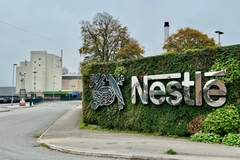
- Industry news
Industry news
- Category news
Category news
- Reports
- Key trends
- Multimedia
- Journal
- Events
- Suppliers
- Home
- Industry news
Industry news
- Category news
Category news
- Reports
- Key trends
- Multimedia
- Events
- Suppliers
Unilever separates ice cream division amid cost-saving shake up and job losses
19 Mar 2024 --- Unilever is spinning off its ice cream division as a standalone business and cutting 7,500 jobs. The separation begins immediately and is part of an overhaul which Unilever says will save around €800 million (US$867.8 million) in costs over the next three years.
The British FMCG multinational says this “productivity program” will drive faster growth and higher margins while better positioning brands such as Ben & Jerry’s, Wall’s and Magnum.
The decision is part of Unilever’s strategy to streamline its operations under its Growth Action Plan announced last year, when its brands together delivered a turnover of €7.9 billion (US$8.6 billion).

“The separation of ice cream and the delivery of the productivity program will help create a simpler, more focused and higher performing Unilever. It will also create a world-leading ice cream business, with strong growth prospects and an exciting future as a standalone business,” says Ian Meakins, chair of Unilever.
“The Board is determined to transform Unilever into a higher-growth, higher-margin business that will deliver consistently for all stakeholders.”
 The separation will make Unilever more focused and higher performing, says Ian Meakins, chair of Unilever.The “demerger”
The separation will make Unilever more focused and higher performing, says Ian Meakins, chair of Unilever.The “demerger”
Unilever says a demerger of its ice cream segment is the most likely separation route, while other options for separation “will be considered to maximize returns for shareholders.”
“The business has five of the top ten selling global ice cream brands including Wall’s, Magnum and Ben & Jerry’s, with exposure in both the in-home and out-of-home segments across a global footprint,” reads a Unilever statement.
“Under new leadership, ice cream is already making significant operational changes at pace that are expected to drive stronger performance. These include improved productivity and efficiencies, product rationalization and investment behind significant innovations.”
According to the Unilever Board, its ice cream business has “distinct characteristics” compared with the behemoth’s other operating businesses. These include a supply chain and point of sale that support frozen goods, a different channel landscape, more seasonality and greater capital intensity.
By isolating the popular frozen product, the company is looking for a “more focused” business approach that will allow its management team to have “operational and financial flexibility” to grow its business and allocate capital and resources to bolster its strategy.
 The company says its ice cream business has “distinct characteristics” compared to its other operating businesses.Optimizing its manufacturing and logistics network and developing wide-reaching, flexible distribution channels are part of the strategy.
The company says its ice cream business has “distinct characteristics” compared to its other operating businesses.Optimizing its manufacturing and logistics network and developing wide-reaching, flexible distribution channels are part of the strategy.
Eyeing improved profitability
Last year, the business reported a drop in ice cream sales due to volume decline and consumers choosing value formats, with the turnover falling by 3.8% to US$16 billion.
The company is now targeting category expansion and delivering accelerated, sustainable levels of growth and improved profitability through a simplified portfolio.
“Under the Growth Action Plan we have committed to do fewer things, better and with greater impact,” says Hein Schumacher, CEO of Unilever.
He says the standalone ice cream business will help the company accelerate that plan, focusing the business and resources on global brands for applying “innovation, technology and go-to-market capabilities” across complementary operating models.
“Simplifying our portfolio and driving greater productivity will allow us to further unlock the potential of this business,” he adds.
What next?
The separation activity will commence immediately, with complete separation expected by the end of 2025.
 Unilever plans to focus its resources on scalable brands to apply its innovation, tech and go-to-market capabilities.The restructuring will leave the company focused on four businesses: beauty and well-being, personal care, home care and nutrition.
Unilever plans to focus its resources on scalable brands to apply its innovation, tech and go-to-market capabilities.The restructuring will leave the company focused on four businesses: beauty and well-being, personal care, home care and nutrition.
Unilever says the decision is expected to impact around 7,500 jobs, with total restructuring costs projected to be nearly 1.2% of group turnover for the next three years (up from the around 1% of Group turnover previously communicated). These proposals will be subject to consultation.
“We are committed to carrying out our productivity program in consultation with employee representatives and with respect and care for those of our people who are impacted,” notes Schumacher.
Following its ice cream portfolio split, Unilever is eyeing a structurally higher margin and aims to deliver “mid-single digit” underlying sales growth and modest margin improvement.
Other industry giants who previously separated their ice cream business include Nestlé SA, which sold its US ice cream operation to Froneri for US$4 billion in 2019.
By Insha Naureen










